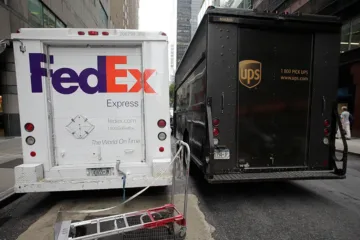Photo Credit: EPA
Shipping Lithium-ion Batteries with UPS and FedEx
Shipping items containing batteries can be tricky. There are regulations which must be followed when transporting batteries and battery-powered equipment. The rules are necessary to ensure safety during transportation and prevent any mishaps during shipping.
UPS and FedEx are two of the largest courier services providing transportation services for packages worldwide, including those containing batteries. Both have specific guidelines and regulations set in place to ensure the safety and compliance of shipping batteries. Below are some of the regulations which must be followed when shipping packages with batteries through UPS and FedEx.
Battery Type and Watt-hour Rating: Both UPS and FedEx have specific guidelines based on the type of battery and its watt-hour rating. Lithium-ion batteries are common in many electronic devices such as smartphones, tablets, and laptops. UPS and FedEx have specific limitations on the watt-hour rating of these batteries which are allowed to be shipped. It is important to check the watt-hour rating of the battery before shipping and ensure that it falls within the guidelines of the courier service.
Markings and Labeling: Packages containing batteries must be marked and labeled correctly according to UPS and FedEx regulations. The label must have specific information regarding the type of battery in the package, its rating, and the number of batteries it contains. Packages must also have a Hazard Class label that corresponds with the type of battery being shipped. This label should be placed on the outside of the package and must be easily visible.
Packaging: Battery-containing packages must be adequately packaged to prevent any damage during shipment. UPS and FedEx require that the package is protected from short-circuiting, and the terminals are covered to prevent any accidental contact. The packaging material should be sturdy and appropriate for the weight and size of the package.
UPS Plane Crash Due to Lithium-ion Battery Fire: In 2010, a UPS plane crashed in Dubai shortly after takeoff. It was later confirmed that the fire which had caused the crash was caused by lithium-ion batteries which were being transported in the cargo section of the plane. The incident demonstrated the importance of following regulations when it comes to shipping batteries. While lithium-ion batteries have become increasingly popular, the guidelines set in place by courier services such as UPS and FedEx are necessary to ensure that such accidents don’t happen anymore.
Incidents of overheated lithium batteries on aircraft are now happening at a rate of more than one per week, on average. In 2022, the Federal Aviation Administration reported at least 62 incidents involving lithium-ion batteries on airplanes and in airports, compared to 54 incidents the previous year. This highlights the need to follow regulations when it comes to shipping batteries, especially when it comes to transporting them through air travel.
In conclusion, shipments containing batteries must comply with UPS and FedEx regulations and key safety measures to prevent mishaps during transportation. Proper packaging, labeling, and markings are essential, and it is important to ensure that your package adheres to these requirements. By following these rules, you can ensure that your package arrives safely and on time without damaging the battery or causing harm to the employees handling it. Always ensure that you are aware of the courier service's guidelines before shipping, and make sure you familiarize yourself with any updates or changes in the regulations.
Here are the links to UPS and FedEx guidelines for shipping items containing batteries:
FedEx: https://www.fedex.com/en-us/shipping/how-to-ship-batteries.html




